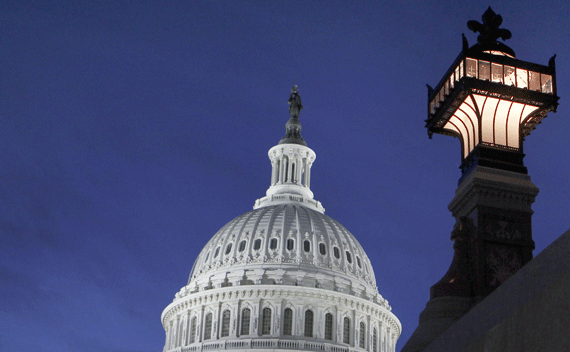House to Vote on Libya
More on:

The House will hold two votes on U.S. participation in the Libya operation, perhaps as early as tomorrow. The votes will reveal a lot about GOP unity on national security and whether President Obama can command the support of his fellow Democrats in the House.
One of the bills is a binding joint resolution that would authorize the “limited use” of the U.S. military to participate in the NATO mission in Libya. The resolution is modeled on a similar one that Senators John Kerry (D-MA) and John McCain (R-AZ) have introduced in the Senate. The resolution also states that "Congress does not support deploying, establishing, or maintaining the presence of units and members of the United States Armed Forces on the ground in Libya" except for search and rescue operations and to protect U.S. government officials who come under direct attack. That provision is nonbinding.
The second bill is a nonbinding concurrent resolution that states that “Congress hereby directs the President to remove United States Armed Forces from hostilities with respect to Libya” within fifteen days of the resolution’s passage. The resolution would, however, allow U.S. military forces to participate in the NATO mission in support roles, which are defined as “search and rescue; intelligence, surveillance, and reconnaissance; aerial refueling; and operational planning.” The exemption for support missions appears intended to limit the resolution’s impact on the NATO mission—and thereby make it easier for House members to vote for it.
A concurrent resolution is the mechanism for ending an unauthorized war that the authors of the War Powers Resolution had in mind when they wrote the law back in 1973. The problem is that ten years later the Supreme Court ruled in I.N.S. v. Chadha that this use of the concurrent resolution, which is known in the trade as a legislative veto, is unconstitutional. Why? Because the Constitution requires that all binding legislation be presented to the president for his signature and therefore be subject to a presidential veto. That’s not the case with a legislative veto. The current Supreme Court almost certainly would not overturn the I.N.S. v. Chadha precedent or find a loophole in it.
House Republicans deserve credit for scheduling a vote. Congress should vote when the country initiates and pursues sustained hostilities abroad. The House GOP leadership probably will not seek to enforce party discipline on the vote, so large numbers of Republicans could end up on opposite sides of the issue. The White House presumably will urge House Democrats to vote against the concurrent resolution even if they cannot bring themselves to vote for the binding resolution of authorization.
The other pressing question is how the votes will turn out. An obvious possibility given bipartisan complaints about the Libya operations is that the House refuses to authorize the mission and demands an end to direct U.S. participation. That would create significant but not insurmountable political problems for the White House. Significant because no president wants to see one house of Congress formally repudiate his policy choices. Not insurmountable because the Senate almost certainly wouldn’t follow the House’s lead and many prominent Republicans would criticize the House vote.
The House could also reject both measures, which would leave most everyone scratching their heads wondering what message lawmakers were trying to send. Such conflicting messages have precedent. In April 1999, the Republican-controlled House refused to vote to support the air campaign in Kosovo. The next month the House voted to fund the Kosovo war.
The White House hopes, of course, that the House votes to authorize the Libya mission. That would make it likely that the Senate would as well. If that happened, President Obama would be on unassailable ground to continue with U.S. participation in military operations in Libya.
How would you vote if you were a member of Congress?
More on:
 Online Store
Online Store
